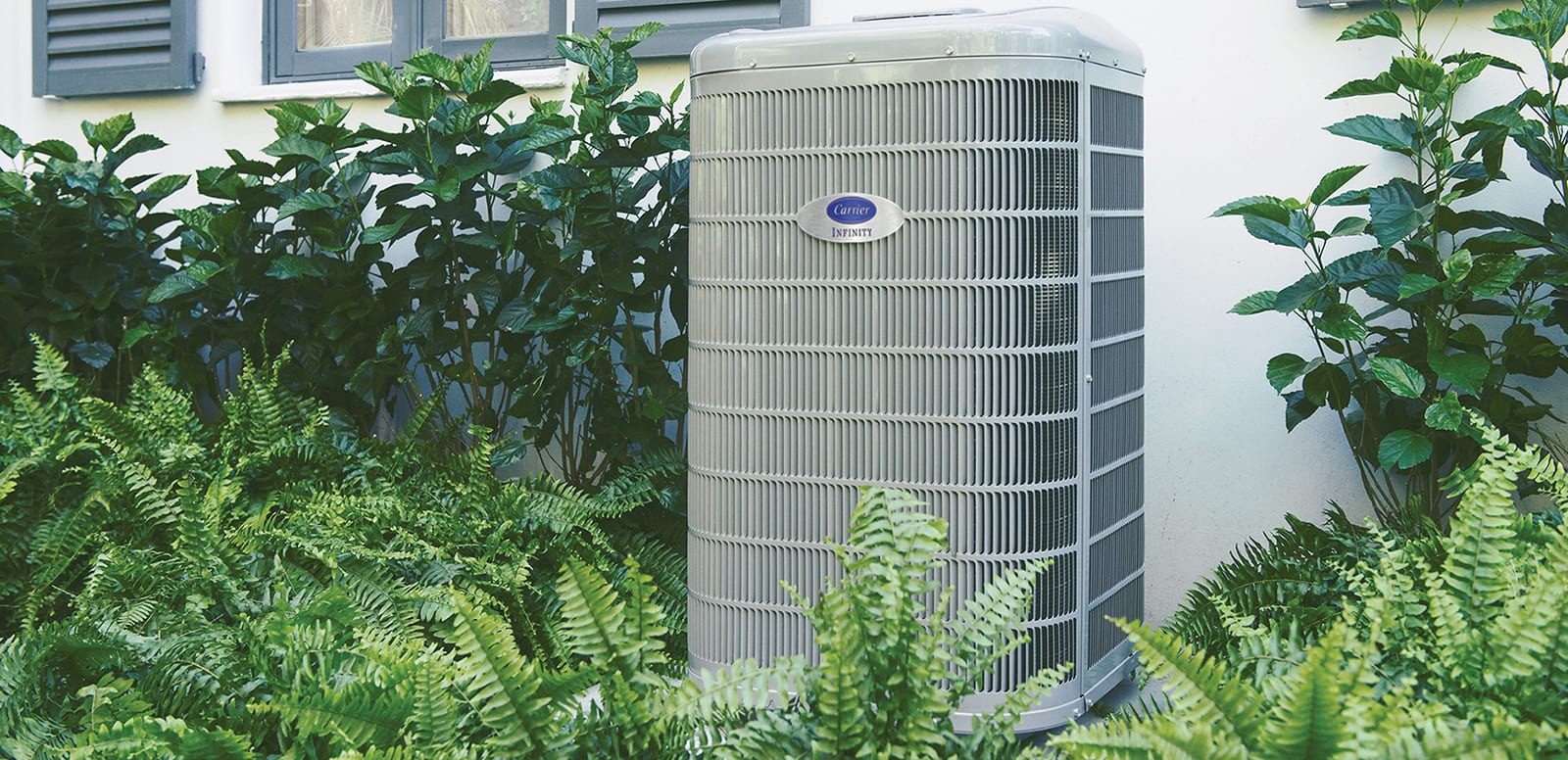Heat Pump vs. Air Conditioning
WHAT ARE HEAT PUMPS
So, what are heat pumps? Well, they're integral components of a home's heating and cooling setup and are typically installed outside the house. A heat pump serves a dual purpose: it can both cool and heat your home. During colder seasons, it extracts warmth from the chilly outdoor air and channels it indoors, while in warmer months, it removes heat from indoor air to keep your home cool. Operating on electricity, heat pumps utilize refrigerant to facilitate the transfer of heat, ensuring year-round comfort. Their versatility means homeowners may not require separate heating and cooling systems. In regions with colder climates, an electric heat strip can augment the indoor fan coil for enhanced heating capabilities. Unlike furnaces, heat pumps don't rely on burning fossil fuels, thus offering an eco-friendlier heating and cooling solution.
WHAT IS AIR CONDITIONING?
Air conditioning is a process that involves the removal of heat and humidity from indoor air to provide a cooler and more comfortable environment. It operates through a system comprising various components, regardless of the specific design of the air conditioner. The process starts with a compressor, which elevates the pressure and temperature of a chemical refrigerant. This heated gas is then sent to the condenser coil, where it undergoes a phase change into a liquid state, releasing heat to the outdoor environment. The now-liquid refrigerant travels indoors to the evaporator coil, where it evaporates, absorbing heat from the indoor air. A fan blows air across the cold evaporator coil, cooling it, and distributing the cooled air throughout the space. Meanwhile, the heated refrigerant gas is returned outside to the compressor, and the cycle repeats until the desired indoor temperature is achieved. Essentially, air conditioning works by transferring heat from inside to outside, creating a cooler indoor atmosphere.
How Are Heat Pumps and Air Conditioners Similar?
When looking for an HVAC system to cool your home, either a heat pump or air conditioner will do the job. Both systems use compressed refrigerant to collect heat from inside your home as air passes over the coil in the air handler and transfer it outside. Heat pumps and air conditioners essentially move heat from inside your home to an outdoor location. It is often thought that air conditioners cool a home by producing cold air, but the truth is they cool your house by removing heat energy from the home, pumping it away to a location outside the home. Air conditioners pump heat out of a home, just like a heat pump when operating in cooling mode. See the similarities? In fact, if looking at the outdoor unit of an air conditioner and heat pump system, it would be very difficult for the average person to tell them apart. So, from a cooling perspective, minus a few technical details, heat pumps and air conditioners are essentially the same when operating in cooling mode, with no significant difference in operation, efficiency, or energy costs.

Differences Between Heat Pumps vs Air Conditioners
How does a heat pump work? How do air conditioners work , exactly? While essentially identical in cooling mode, heating mode is a completely different story. Air conditioners do not provide heating, but heat pumps do. Thanks to a reversing valve in the outdoor unit, a heat pump system works by extracting heat energy from outside air, even in extremely cold temperatures, transferring the heat inside the home, where it releases the heat into the air. A heat pump can heat and cool, but an air conditioner cannot, which is the primary difference between the two HVAC systems. An air conditioner is typically paired with a furnace to provide heat during the cold months. Together, an air conditioner and furnace are a complete heating and cooling system, otherwise known as a split system.
Although a heat pump can heat a home, when outside temperatures drop below freezing, the efficiency of a heat pump is affected as the unit requires more energy to maintain warm temperatures inside the home. Typical heat pump systems have an auxiliary electric heater added to the indoor air unit to add supplemental heat when outdoor temperatures drop. However because electric auxiliary heating Is not very efficient, the addition of a furnace can be a solution to this problem, creating a system that relies on the heat pump as the primary heat source but automatically switches to the furnace when appropriate. This Hybrid Heat® technology is both efficient and intelligent.

AC VS. HEAT PUMP: Which System is Right for You?
Both a heat pump and an air conditioner are a great choice, but one might be more appropriate for you, depending on your situation. Here are some things to consider when choosing a system to heat and cool your home.
Heat Pump Vs. Air Conditioner Cost
While a heat pump system has a lower cost indoor unit, the outdoor unit can come with a higher upfront cost compared to an air conditioner. When considering Carrier air conditioner cost, it is important to understand the total costs to install a system that can both cool and heat your home properly. A Carrier HVAC dealer can help determine all of the costs involved. Learn more about heat pump cost.
Difference Between Heat Pump and Air Conditioner Energy Efficiency
In moderately cold outdoor temperatures, heat pump systems provide energy-efficient heating using only electricity. In these conditions they can be less costly to operate compared to systems that use more expensive heating fuel sources such as natural gas, oil or propane. As temperatures drop below freezing, the heat pump requires more energy to maintain comfort inside, reducing efficiency and increasing your electric bill. You can solve this problem by pairing a heat pump with a Carrier furnace, creating a dual fuel system. However, due to the higher initial cost for the heat pump unit, a hybrid system may be more expensive than a more commonly paired system of an air conditioner and furnace.
In cooling mode, both heat pumps and air conditioners come in models with high SEER2 ratings, providing energy efficient cooling during the warm summer months. SEER2 ratings are like miles-per-gallon for a car. They give you a standard measure of efficiency so you can compare different models. The higher the SEER2, the more efficient the unit. In heating mode, heat pump efficiency is expressed in HSPF2. The higher the HSPF2, the higher the efficiency. In many ways, the energy efficiency and cost to operate factor comes down to location. In areas with moderate temperatures, a heat pump is a better option for efficient heating than in areas with extremely cold winters. If you want a higher efficiency model, be sure to select one that has been ENERGY STAR® certified.
Check out our Ductless heat pump solutions
AIR CONDITIONER VS HEAT PUMP COST
The price of both an air conditioner and heat pump can fluctuate based on several factors, including unit size, efficiency, additional comfort features, and installation expenses tailored to your home. Typically, both systems can cost anywhere from $3,000 to $15,000. Smaller units with single-stage performance, meaning they operate in an on/off mode, often fall within the lower end of this range. However, more advanced variable-speed systems, which offer higher efficiencies and improved humidity control for enhanced comfort, may fall toward the higher end of the price spectrum. It's important to note that installation costs can vary significantly based on the specifics of your home. For accurate pricing tailored to your needs, it's advisable to seek an in-home consultation and quote from a local expert, such as a Carrier dealer.
Ask an Expert
Whether replacing an existing HVAC system for your home, or purchasing one for the first time, there are several important differences to consider when choosing between a heat pump and an air conditioner. Besides choosing the best system for your situation, the size of the unit and its heating/cooling capacity will need to be determined. A proper evaluation of your home’s heating and cooling needs by a trained HVAC professional is the best way to determine the ideal option for you. Local Carrier HVAC experts are available to help evaluate your situation, help you decide between a heat pump vs AC system and provide professional HVAC installation services.
Click here to learn more on ductless mini splits.

HEAT PUMP VS AIR CONDITIONER FREQUENTLY ASKED QUESTIONS

Learn More About Heat Pump vs AC
- What is a heat pump?
- Learn more about heat pump service
- Get help with heat pump troubleshooting
- Find out more about heat pump efficiency
- Get information about the cost of a heat pump
- Heat Pumps: A Sustainable Comfort Solution
- Discover heat pump tax credits
- In need of heat pump repair?
- Learn about heat pump installation
- How much will a heat pump increase my electric bill?
- Get in the know on cold climate heat pumps
- Discover what an air source heat pump is

